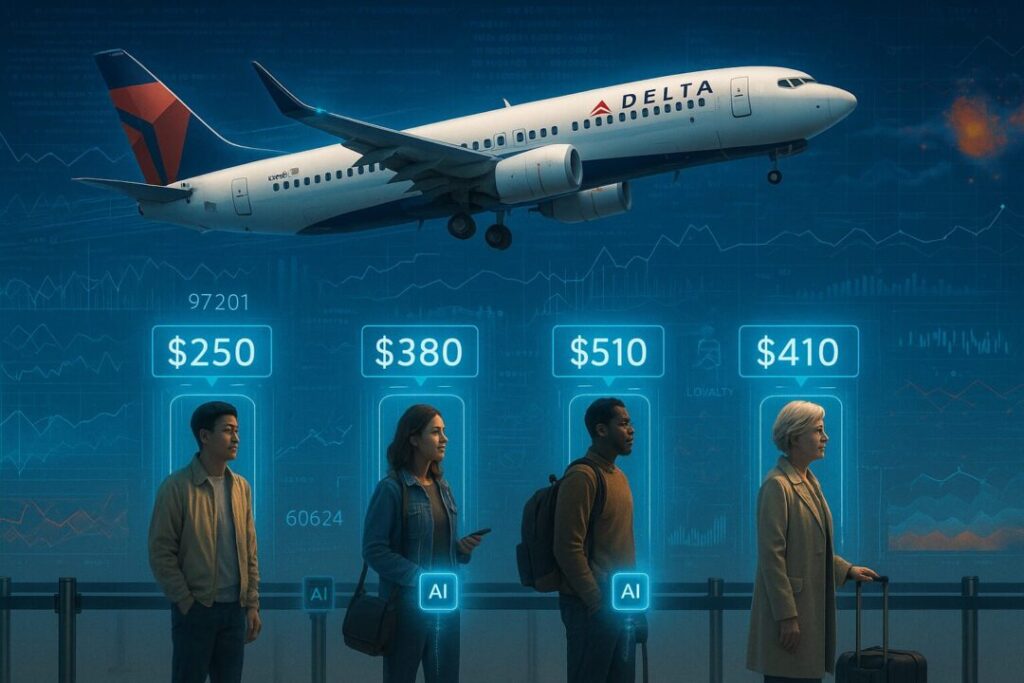Imagine shopping for a plane ticket, and the price you see isn’t just based on the day or destination – but who you are, where you live, and how often you fly.
That’s not a dystopian movie plot. It’s happening right now at Delta Air Lines.
Delta is rolling out a new artificial intelligence (AI) pricing system that sets ticket prices just for you.
This isn’t the usual pricing shuffle we’ve all seen before where prices change by the hour or depending on how close the flight is.
The Rise of “Personalized Pricing”
Since late 2024, Delta has been quietly testing this new system with an Israeli tech firm called Fetcherr. Back then, only about 1% of flights used this tech.
Now it’s up to 3%, and Delta says it wants 20% of its domestic tickets using the AI by the end of the year.
The goal? Replace traditional airfare pricing with something totally personal.
This system looks at everything from your browsing habits and travel history to your ZIP code, loyalty status, and even how urgently you’re searching. Then, in seconds, it creates a price it thinks you’ll pay.
Delta President Glen Hauenstein calls it a “super analyst” that never sleeps. It constantly studies market trends, weather, economic signals, and more – then tailors the price just for your situation.
Big Profits for Delta
From a business perspective, it’s working. Delta says it’s seeing “amazingly favorable” revenue from the pilot program.
A 2022 Yale study even predicted airlines could boost profits by up to 5% with this kind of pricing. If you’re Delta’s accountant, that’s great news.
But if you’re a traveler just trying to book a family vacation – or worse, a last-minute trip for a funeral – that’s a different story.
A Conservative Look at the Risks
This kind of tech may be “cutting edge,” but it raises real concerns about fairness, privacy, and trust.
For starters, people may end up paying very different prices for the exact same flight, based only on personal data, and there’s no easy way to know it’s happening.
Delta claims the system doesn’t discriminate and only uses “trip-related” info.
But critics worry that some of the data used (like ZIP codes or browsing behavior) could still lead to higher prices for lower-income families or certain communities.
That’s not just a gut feeling. People are already sounding the alarm. Justin Kloczko from Consumer Watchdog called it like “hacking our brains.”
Even Democrat Senator Ruben Gallego said it could be “predatory pricing.”
And if other airlines copy Delta’s move, what happens to competition? If all the major airlines use the same tech from Fetcherr, could it lead to price-fixing?
Conservatives Raise the Red Flag
It’s one thing for a business to adjust prices based on supply and demand; that’s capitalism.
Using personal data to quietly squeeze more money from loyal customers, working families, or people in emergencies feels more like manipulation than free-market fairness.
Wendy’s faced public outrage earlier this year over “surge pricing” for burgers.
If Americans push back against $7 fries, they’re definitely going to notice when their flights double in price just because they looked at hotels the night before.
What Can You Do?
If you still plan to fly Delta or want to protect your wallet from others doing the same, there are a few simple steps:
-
Browse in incognito mode or use a VPN to hide your location and history.
-
Compare prices on third-party sites like Google Flights before buying directly.
-
Watch out for loyalty traps. Frequent flyers might actually get worse deals if the AI thinks they’ll pay more.
This AI system wasn’t built to get you the best price. It was built to get Delta the best profit.
This is a test case for what happens when tech meets everyday people.
If left unchecked, AI-powered pricing could quietly reshape the cost of living – starting with airfare, but maybe spreading to hotels, rental cars, even groceries.
Delta says it’s about “customization.” If the price of your flight now depends on how much money an AI thinks it can suck out of you, that’s no customization Americans are interested in.
This article was written with the assistance of AI. Please verify information and consult additional sources as needed.




